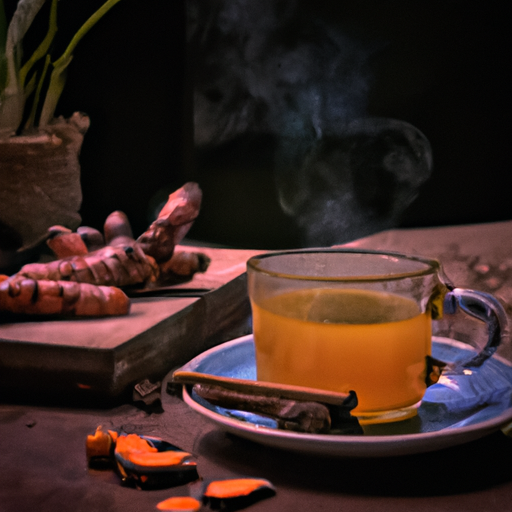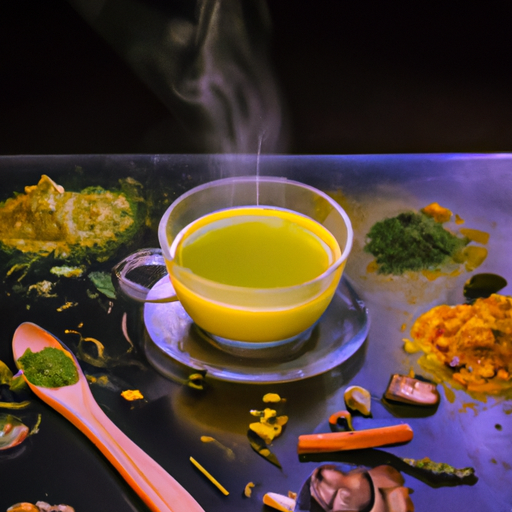I have always been intrigued by the health benefits of natural foods and remedies. Recently, I came across turmeric, a spice often used in Indian cooking for its bright color and distinct taste. Did you realize that turmeric is also loaded with potent antioxidants and anti-inflammatory properties that can enhance your overall well-being?
And what better way to enjoy these benefits than through a warm, comforting cup of turmeric tea? In this article, I’ll share with you my simple recipe for making turmeric tea at home. You’ll learn how to gather the right ingredients, boil the water, and add any optional add-ins to enhance the flavor and health benefits of your tea.
So, grab a mug and let’s get started!
Key Takeaways
- Turmeric tea is made with turmeric, ginger, honey, black pepper, and water.
- The active ingredient in turmeric, curcumin, has anti-inflammatory and antioxidant properties.
- Different types of tea, milk, and sweeteners can be used for unique flavor variations.
- Turmeric tea can improve digestion, reduce inflammation, and boost immunity.
Gather Your Ingredients
You’ll need to gather your ingredients before beginning to make turmeric tea, so make sure you have turmeric, ginger, honey, black pepper, and water at the ready. Turmeric is a spice that’s been used for medicinal purposes for thousands of years and has numerous health benefits. Curcumin, the active ingredient in turmeric, has anti-inflammatory and antioxidant properties.
Ginger is also known for its anti-inflammatory effects, while black pepper helps with the absorption of curcumin. Honey is a natural sweetener that also has antibacterial properties.
There are different types of tea to try with turmeric, such as green tea, chai, or even just plain turmeric tea. Green tea is rich in antioxidants and has been shown to improve brain function, boost metabolism, and reduce the risk of certain types of cancer. Chai tea is a blend of black tea and spices such as cinnamon, cardamom, and cloves, which gives it a warm, comforting flavor.
Plain turmeric tea is made by simply boiling turmeric and water together. Once you have your ingredients ready, it’s time to boil the water.
Boil the Water
Start by bringing the water to a boil. It’s important to note that the temperature of the water will affect the taste and potency of your turmeric tea. Ideally, you want to use water that’s between 190-200°F (87-93°C) to allow the turmeric to release its beneficial compounds.
Here are some tips to help you boil the water correctly:
- Use a kettle or pot with a lid to prevent heat from escaping and speed up the boiling process.
- Don’t use distilled water as it lacks essential minerals that aid in the extraction of turmeric’s properties.
- If you’re using tap water, let it run for a few seconds to get rid of any unwanted flavors or chemicals.
- Keep an eye on the water as it boils to avoid over boiling or burning it.
- Once the water reaches the desired temperature, turn off the heat and let it cool for a minute or two before pouring it over the turmeric.
After boiling the water, it’s time to add the turmeric and optional add-ins to make your tea.
Add the Turmeric and Optional Add-Ins
Now that I’ve boiled the water, it’s time to add the star ingredient – turmeric.
I measure out a teaspoon of turmeric powder and sprinkle it into the hot water, stirring it until it dissolves completely.
Depending on my mood, I might also add some fresh ginger slices, a drizzle of honey, or a squeeze of lemon juice to enhance the flavor and health benefits of the tea.
These add-ins not only make the tea taste better but also bring their own anti-inflammatory, antioxidant, and digestive benefits to the table.
Measuring the Turmeric
Firstly, grab your favorite measuring spoon and scoop out the desired amount of turmeric powder to add to your tea. The amount of turmeric you add can vary depending on your preference and the desired strength of your tea. It’s important to note that the recommended daily dosage of turmeric for adults is 500-2000mg, which equates to about 1-2 teaspoons of turmeric powder.
Not only does turmeric add flavor and color to your tea, but it also has numerous health benefits. The active ingredient in turmeric, curcumin, has anti-inflammatory and antioxidant properties that can help reduce inflammation and oxidative stress in the body. Incorporating turmeric into your daily routine can provide a natural boost to your overall health and wellness.
Now, let’s move on to the next step of adding ginger, honey, or lemon to your turmeric tea.
Adding Ginger, Honey, or Lemon
Ginger, honey, or lemon are great additions to give your turmeric tonic a tangy twist and tantalize your taste buds. Not only do these ingredients enhance the flavor of your tea, but they also offer additional health benefits.
Ginger is a natural anti-inflammatory agent and can help ease digestive issues. Honey, on the other hand, has antibacterial properties and can soothe a sore throat. Lemon is a great source of vitamin C and can help boost your immune system.
When adding these ingredients to your turmeric tea, there are a few benefits and precautions to keep in mind. For example, ginger and lemon can increase the potency of the turmeric, so be mindful of how much you add. Additionally, some people may be allergic to ginger or honey, so it’s important to check for any allergies before adding these ingredients.
As for flavor combinations, you can mix and match to find your favorite blend. Some people prefer a stronger ginger taste, while others like a sweeter tea with honey. The possibilities are endless!
Now that you’ve added ginger, honey, or lemon to your turmeric tea, it’s time to let the mixture simmer.
Let the Mixture Simmer
As the turmeric and water come to a boil, reduce the heat and allow the mixture to simmer for about 10 minutes, infusing the water with the warm, earthy flavors of the turmeric.
This simmering process is crucial as it helps to release the active compounds in turmeric, including curcumin, which is known for its anti-inflammatory and antioxidant properties. These compounds are what give turmeric tea its numerous health benefits, such as improving digestion, reducing inflammation, and boosting immunity.
There are various ways to make turmeric tea, and the simmering time may vary depending on the recipe. Some variations include adding black pepper, cinnamon, or cardamom to enhance the flavor and increase the absorption of curcumin in the body. Others may use coconut milk or almond milk for a creamier texture.
Regardless of the recipe, letting the mixture simmer ensures that all the ingredients are well combined, and the flavors are fully infused. Once the simmering is complete, strain the mixture and enjoy your warm and comforting cup of turmeric tea.
Strain and Enjoy!
Now it’s time to savor the fruits of your labor and indulge in the warm and soothing cup of turmeric tea that you’ve brewed. After letting the mixture simmer for about 10 minutes, it’s time to strain the tea. You can use a fine mesh strainer or cheesecloth to remove any remaining particles.
Once strained, you can add some honey or lemon to enhance the flavor and experience the full benefits of turmeric tea.
Health benefits: Turmeric is known for its anti-inflammatory, antioxidant, and anti-cancer properties. Drinking turmeric tea regularly can help improve digestion, boost immunity, reduce joint pain, and lower the risk of chronic diseases.
Flavor variations: You can experiment with different ingredients to create unique and delicious flavor variations of turmeric tea. Some popular options include adding ginger, cinnamon, cardamom, or black pepper. You can also use different types of milk or sweeteners to cater to your taste preferences.
Frequently Asked Questions
What are the health benefits of turmeric tea?
As someone who regularly drinks turmeric tea, I can attest to its numerous health benefits. Turmeric tea is known for its anti-inflammatory properties, which can help with a variety of ailments. Additionally, it has been linked to improved digestive health.
Can I use fresh turmeric instead of powdered turmeric?
Yes, you can use fresh turmeric to make tea. It contains curcumin, a compound with anti-inflammatory properties. Studies show it may help reduce pain, improve brain function, and lower the risk of chronic diseases.
How much turmeric should I use to make a cup of tea?
Did you know that adding black pepper to your turmeric tea can increase its absorption by 2000%? To make a cup, I use 1 teaspoon of turmeric and experiment with different ratios and blends.
Can I add honey or sugar to sweeten the tea?
When sweetening turmeric tea, I prefer using honey for its natural sweetness and health benefits. Adding milk is also a great option, as it can enhance the flavor and increase the absorption of turmeric’s active ingredient, curcumin.
How long can I store leftover turmeric tea in the fridge?
I made a batch of turmeric tea yesterday and had some leftover. To store it, I transferred it to an airtight container and put it in the fridge. It can last up to 3 days. It’s important to note that the longer it sits, the less potent it becomes.
Conclusion
So there you have it, folks! Making your own turmeric tea isn’t just easy, but it also has numerous health benefits.
As a scientist, I’ve always been intrigued by the many health claims surrounding turmeric. And after conducting my own research, I’ve found that many of these claims are indeed true.
Turmeric has anti-inflammatory properties that can help reduce pain and swelling in the body. It also has antioxidants that can help protect against various diseases.
So not only is turmeric tea a delicious and soothing beverage, but it can also be a great addition to any healthy lifestyle. Give it a try and see how it can work for you!










